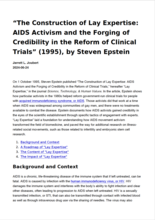Filter my results


Ethical Issues in Human Stem Cell Research: Executive Summary was published in September 1999 by The US National Bioethics Advisory Commission in…
LiteraturebioethicsStem cells--ResearchEmbryonic Stem CellsStem Cells
In 2006, bioethicist Jason Scott Robert published “The Science and Ethics of Making Part-Human Animals in Stem Cell Biology” in The FASEB Journal.…
LiteratureGeneticsbioethicsStem Cell ResearchStem Cells
Human pluripotent stem cells are valued for their potential to form numerous specialized cells and for their longevity. In the US, where a portion of…
LiteratureKass, LeonStem CellsPublicationsethics
Since the 1950s, scientists have developed interspecies blastocysts in laboratory settings, but not until the 1990s did proposals emerge to engineer…
BlastocystDiseasesbioethicsTadpoleCell nuclei--Transplantation
The South Korean government passed the Bioethics and Biosafety Act, known henceforth as the Bioethics Act, in 2003 and it took effect in 2005. South…
LawbioethicsInformed consent (Medical law)Embryonic Stem CellsEmbryonic stem cells--Research--Law and legislation
The US President's Council on Bioethics was an organization headquartered in Washington D.C. that was chartered to advise then US President George W…
OrganizationbioethicsAdvisory boardsStem CellsEmbryonic Stem Cells
In 2007, Françoise Baylis and Jason Scott Robert published “Part-Human Chimeras: Worrying the Facts, Probing the Ethics” in The American Journal of…
LiteratureChimerismNeuronsChimeraGenetics
Hwang Woo-suk, a geneticist in South Korea, claimed in Science magazine in 2004 and 2005 that he and a team of researchers had for the first time…
ContextbioethicsHuman cloning--Research--Law and legislationInformed consent (Medical law)Oocyte Donation
On 1 October 1995, Steven Epstein published “The Construction of Lay Expertise: AIDS Activism and the Forging of Credibility in the Reform of…
HIV SeropositivityAcquired Immunodeficiency SyndromePneumocystis cariniiPneumocystis InfectionsHIV
In Jeter v. Mayo, the Court of Appeals of Arizona in 2005 held that a cryopreserved, three-day-old pre-embryo is not a person for purposes of Arizona…
LawCryopreservationEmbryo transplantationFrozen human embryosFertilization in Vitro